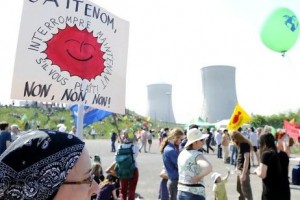Rifts are developling in Europe over the future of nuclear energy after the Fukushima meltdown in Japan a year ago. While some nations, including Germany, Italy and Switzerland, have decided to pull out of nuclear energy altogether, other s – notably France, Britain and Poland – are pushing ahead with plans to construct new reactors. Martin Schulz, the German president of the European parliament, warned on Tuesday that while choices over nuclear power rested with national governments, “we are all interconnected and all countries have neighbours”. There have even been proposals for a campaign later this year to force the EU to outlaw any new nuclear plant construction. France is already at odds with both Germany and Luxembourg over what the Germans describe as the “enormous risk potential” of the four ageing reactors at Cattenom in Lorraine in northern France. The Germans are relying on renewable energy, particularly wind and solar power where it is among the world leaders, to fill the energy gap. Others, such as Britain, believe that renewables and energy-conservation measures can only be part of the answer, particularly if carbon-emissions targets are to be met.
s – notably France, Britain and Poland – are pushing ahead with plans to construct new reactors. Martin Schulz, the German president of the European parliament, warned on Tuesday that while choices over nuclear power rested with national governments, “we are all interconnected and all countries have neighbours”. There have even been proposals for a campaign later this year to force the EU to outlaw any new nuclear plant construction. France is already at odds with both Germany and Luxembourg over what the Germans describe as the “enormous risk potential” of the four ageing reactors at Cattenom in Lorraine in northern France. The Germans are relying on renewable energy, particularly wind and solar power where it is among the world leaders, to fill the energy gap. Others, such as Britain, believe that renewables and energy-conservation measures can only be part of the answer, particularly if carbon-emissions targets are to be met.
